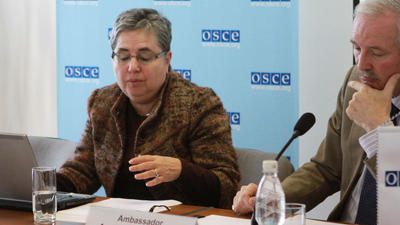-
Our work
-
Fields of work
- Arms control
- Border management
- Combating trafficking in human beings
- Conflict prevention and resolution
- Countering terrorism
- Cyber/ICT Security
- Democratization
- Economic activities
- Education
- Elections
- Environmental activities
- Gender equality
- Good governance
- Human rights
- Media freedom and development
- Migration
- National minority issues
- Policing
- Reform and co-operation in the security sector
- Roma and Sinti
- Rule of law
- Tolerance and non-discrimination
- Youth
- Field operations
- Projects
-
Meetings and conferences
- Summit meetings
- Review Conferences
- Ministerial Council meetings
- Plenary meetings of the Permanent Council
- Plenary Meetings of the Forum for Security Co-operation
- Security Review Conferences
- Annual Implementation Assessment Meetings
- Economic and Environmental Forum
- Economic and Environmental Dimension Implementation Meetings
- Human rights meetings
- Media conferences
- Cyber/ICT security conferences
- Conference of the Alliance against Trafficking in Persons
- Gender equality conferences
- Annual OSCE Mediterranean conferences
- Annual OSCE Asian conferences
- Partnerships
-
Fields of work
-
Countries
- All
-
Participating States
- Albania
- Andorra
- Armenia
- Austria
- Azerbaijan
- Belgium
- Belarus
- Bosnia and Herzegovina
- Bulgaria
- Canada
- Croatia
- Cyprus
- Czechia
- Denmark
- Estonia
- Finland – OSCE Chairpersonship 2025
- France
- Georgia
- Germany
- Greece
- Holy See
- Hungary
- Iceland
- Ireland
- Italy
- Kazakhstan
- Kyrgyzstan
- Latvia
- Liechtenstein
- Lithuania
- Luxembourg
- Malta
- Moldova
- Monaco
- Mongolia
- Montenegro
- The Netherlands
- North Macedonia
- Norway
- Poland
- Portugal
- Romania
- Russian Federation
- San Marino
- Serbia
- Slovakia
- Slovenia
- Spain
- Sweden
- Switzerland
- Tajikistan
- Türkiye
- Turkmenistan
- Ukraine
- United Kingdom
- United States of America
- Uzbekistan
- Asian Partners for Co-operation
- Mediterranean Partners for Co-operation
-
Structures and institutions
- Chairpersonship
-
Secretariat
- Secretary General
- Office of the Secretary General
- Conflict Prevention Centre
- Transnational Threats Department
- Office of the Special Representative and Co-ordinator for Combating Trafficking in Human Beings
- Office of the Co-ordinator of OSCE Economic and Environmental Activities
- Gender Issues Programme
- Opportunities for Youth
- Department of Human Resources
- Department of Management and Finance
- Office of Internal Oversight
- Documentation Centre in Prague
- Institutions
-
Field operations
- Presence in Albania
- Centre in Ashgabat
- Programme Office in Astana
- Programme Office in Bishkek
- Mission to Bosnia and Herzegovina
- Programme Office in Dushanbe
- Mission in Kosovo
- Mission to Moldova
- Mission to Montenegro
- Mission to Serbia
- Mission to Skopje
- Project Co-ordinator in Uzbekistan
- Closed field activities
- Parliamentary Assembly
- Court of Conciliation and Arbitration
- Organizational structure
- About us
Press release
Experts discuss future prospects for Central Asia at OSCE Academy in Bishkek

- Date:
- Source:
- OSCE Chairpersonship, OSCE Programme Office in Bishkek
- Fields of work:
- Education
BISHKEK, 12 October 2010 - A seminar supported by Kazakhstan's OSCE Chairmanship to mark the twentieth anniversary of the OSCE Charter of Paris and nearly two decades of independence of the Central Asian states was held at the OSCE Academy in Bishkek today.
The participants discussed political and strategic changes in Central Asia over the last 20 years, perspectives on Kyrgyzstan in light of recent tragic events and the 10 October parliamentary elections, and the regional implications of the situation in Afghanistan.
Speakers at the one-day event included Martha Olcott from the Carnegie Endowment for International Peace, Neil MacFarlane of Oxford University, Andres Ilves of the BBC and Peace Direct UK and Kazakhstan's Deputy Permanent Representative to the OSCE, Usen Suleimenov.
"Twenty years ago, as the Cold War was finally drawing to a close, the visionary leaders of North America, Europe and the then-Soviet Union gathered together and signed the Charter of Paris for a New Europe, declaring that 'the era of confrontation and division of Europe has ended' and a 'new era of democracy, peace and unity' has begun," said the OSCE Chairperson-in-Office, Kazakhstan's Secretary of State and Foreign Minister Kanat Saudabayev, in a message to participants.
"It is time once again to show vision and resolve, and realize a common Euro-Atlantic and Eurasian security space, free of dividing lines."
Fifty-five participants, including students from the OSCE Academy and other Bishkek-based universities, attended.
Director of the OSCE Academy Maxim Ryabkov said: "The OSCE Academy is a unique institution in the region, aimed at preparing promising graduates from Central Asia for public service in their countries. This seminar, which brings high-level experts from prestigious institutions to the Academy, allows our students to engage in some of the wider debates on security that are taking place at the highest political level."
The OSCE Academy is a post-graduate institution for students from Central Asia, including Afghanistan. It runs a one-year Masters programme on political science supported by a scholarship programme as well as professional training courses on conflict prevention, public policy, human rights and journalism.
The Academy holds an annual international seminar on security in Central Asia, organized jointly with the Geneva Centre for Security Policy, the Norwegian Institute of International Affairs and the Near East South Asia Centre for Strategic Studies (National Defence University) as well as other conferences, conducts research projects and publishes occasional papers.
A report based on the keynote presentations and proceedings will be published in December.